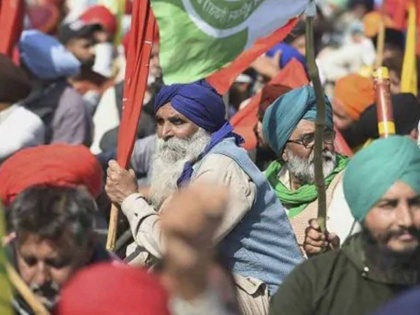Farmers Protest: Why it has caused a huge uproar in India
By Lokmat English Desk | Published: February 6, 2021 09:44 PM2021-02-06T21:44:06+5:302021-02-06T21:54:40+5:30
Farmers have been protesting against three farm laws published by the government under Prime Minister Narendra Modi as they ...

Farmers Protest: Why it has caused a huge uproar in India
Farmers have been protesting against three farm laws published by the government under Prime Minister Narendra Modi as they want the laws cancelled.The protests have mainly been led by farmers from Punjab and Haryana, but now thousands are joining in from other parts of the country, particularly from western Uttar Pradesh.The Supreme Court of India has suspended the implementation of the laws and constituted a committee. The executive cannot proceed with the implementation of the laws yet. In September 2020, President Ram Nath Kovind gave his assent to the three 'Agriculture Bills' that were earlier passed by the Indian Parliament.
What are these farm laws and what they provide for?
The Farmers’ Produce Trade and Commerce (Promotion and Facilitation) Act provides for setting up a mechanism allowing the farmers to sell their farm produces outside the Agriculture Produce Market Committees (APMCs). Any licence-holder trader can buy the produce from the farmers at mutually agreed prices. This trade of farm produces will be free of mandi tax imposed by the state governments.
The Farmers (Empowerment and Protection) Agreement of Price Assurance and Farm Services Act allows farmers to do contract farming and market their produces freely.
The Essential Commodities (Amendment) Act is an amendment to the existing Essential Commodities Act. This law now frees items such as food grains, pulses, edible oils and onion for trade except in extraordinary (read crisis) situations.
The government has presented these laws as reforms akin to the 1991-opening of the Indian economy linking it with the globalised markets. It has argued that the three laws open up new opportunities for the farmers so that they can earn more from their farm produces. The government has said the new laws will help to strengthen basic farm sector infrastructure through greater private investments. According to statistics, an average family of farmers in India earns only Rs 8,931 every month. That is, the whole family runs a maximum of 300 rupees a day. The whole family works, but does not even get a minimum wage of Rs 176 according to the five members. Whereas in India, the income per month per family is 55 thousand rupees. A common family in India earns five times more than farmers. But this pain of the farmers increases then. When it is compared to developed countries. In America, if a common family earns 3.79 lakh rupees a month, and the farmer's family earns 4.35 lakh rupees more in that month. That is, in America, the family of farmers earns 15 percent more than a common family. Whereas the farmer's family earns 84 per cent less than a common family in India. Whether it is a needle-making factory or a ship-making company, everyone decides at what rate they sell their goods in the market, but the farmer did not get the right to decide the market price of his crop after independence and despite independence. Article 21 of our Constitution gives us the right to live, but the right to live is only one aspect and the right to livelihood is included in the right to live. It is to be noted here that if the farmer who is called Annadata does not get to decide the price of the grain grown in his field, then where is his right to livelihood? In a way the livelihood without rights is also putting his life in the dark.
Meanwhile, the US is supportive of the Indian government's move to reform the agricultural sector that attracts private investment and greater market access to farmers, a State Department spokesperson said: "In general, the United States welcomes steps that would improve the efficiency of India's markets and attract greater private sector investment. "US also signalled concern about internet shutdowns imposed at the farmers’ protest sites to suppress demonstrations, citing law and order situation. “We recognise that unhindered access to information, including the internet, is fundamental to the freedom of expression and a hallmark of a thriving democracy,” a US State Department spokesperson said, according to The Wall Street Journal. Meanwhile, several other American lawmakers and celebs including, Rihanna, Mia Khalifa and Greta Thunberg all came out in support of the farmer protests in India which further fuelled the protest.